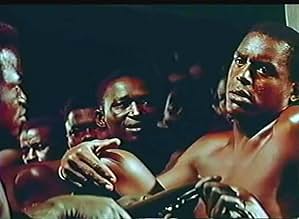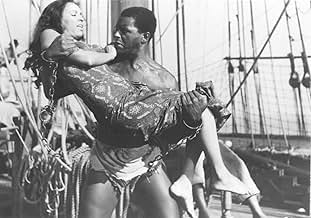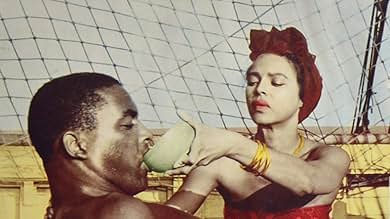Tamango
- 1958
- Tous publics
- 1h 44m
IMDb RATING
6.5/10
470
YOUR RATING
A Dutch slave captain, on a voyage to Cuba, faces a revolt fomented by a newly captured African slave, Tamango. The slaves capture the captain's mistress, forcing a showdown.A Dutch slave captain, on a voyage to Cuba, faces a revolt fomented by a newly captured African slave, Tamango. The slaves capture the captain's mistress, forcing a showdown.A Dutch slave captain, on a voyage to Cuba, faces a revolt fomented by a newly captured African slave, Tamango. The slaves capture the captain's mistress, forcing a showdown.
Featured reviews
A movie that, in 1958, at last began to approach the real horror of slavery, and gives us a suspenseful story besides. A group of Africans is taken aboard a Dutch slave ship in 1820, and their leader, Tamango (Alex Cressan) begins planning a rebellion, at first rather quietly, with what is practically civil disobedience - not eating the food. The film does a fantastic job at humanizing the Africans, and we see their reactions to be what any other captive group's would be, covering a wide range - despair, fear, submission, bravery, and intelligent scheming. We see the outright cruelty on the part of the slavers - throwing a man overboard to make an example to the group, hanging another, and leaving Tamango out in the sun as punishment - but to director John Berry's credit, it's not overdone, and we see the human side of these people as well, in their conversations and little moments. Far more insidious is the pervading view of racial superiority, so that underneath what is apparent civility is a monster, one that views others as property, and of no more value than that.
To those who cringe because Dorothy Dandridge is a "mistress" or is involved in an "interracial romance" because they believe it takes away from the central message of the film, I ask that you look again - she's a slave, owned by the captain of the ship, and forced to have sex with him. She makes what she really thinks of him very clear when he dupes her into thinking he's written out orders for her freedom. I think it does the film a disservice to see her involvement with the man as willing, and it does Dandridge one as well, since the actress fought for changes to the script to make this point clear. It's ironic that the miscegenation that got the film banned by conservatives in the United States upon its release in France, is today decried by liberals as a weakness, when neither group seem to fully recognize the main point of the film, and what Dandridge's (admittedly conflicted) role was.
With that said, there is something a little off about the film as a whole - probably the dialogue, which seems a little stilted at times (even allowing it the shortcut of not showing the usage of translators between languages, and has everyone speaking English). The acting itself is fine, and it's well cast. It's a shame that this was Alex Cressan's only performance, because he has such strong presence. Dandridge was at the height of her powers, and while that sadly had very little roles coming her way even after her fantastic performance four years earlier in 'Carmen Jones', she's a joy to behold here. Curd Jürgens is great as well as the captain, and the staging about the ship is reasonably realistic as well.
If you look at a list of films which portray slavery sorted by year, you'll see 'Tamango' is one of the earliest to show it honestly, and for that, it deserves respect. The film feels ahead of its time, and I admire blacklisted director John Berry's courage. He went to Europe and made a film that certainly didn't make him more loved in America because of its scenes with Dandridge and Jürgens kissing, and because of its realistic portrayal of slavery - something Hollywood and America were still having a hard time coming to terms with. Not perfect, but a very good film, and deserves to be better known.
To those who cringe because Dorothy Dandridge is a "mistress" or is involved in an "interracial romance" because they believe it takes away from the central message of the film, I ask that you look again - she's a slave, owned by the captain of the ship, and forced to have sex with him. She makes what she really thinks of him very clear when he dupes her into thinking he's written out orders for her freedom. I think it does the film a disservice to see her involvement with the man as willing, and it does Dandridge one as well, since the actress fought for changes to the script to make this point clear. It's ironic that the miscegenation that got the film banned by conservatives in the United States upon its release in France, is today decried by liberals as a weakness, when neither group seem to fully recognize the main point of the film, and what Dandridge's (admittedly conflicted) role was.
With that said, there is something a little off about the film as a whole - probably the dialogue, which seems a little stilted at times (even allowing it the shortcut of not showing the usage of translators between languages, and has everyone speaking English). The acting itself is fine, and it's well cast. It's a shame that this was Alex Cressan's only performance, because he has such strong presence. Dandridge was at the height of her powers, and while that sadly had very little roles coming her way even after her fantastic performance four years earlier in 'Carmen Jones', she's a joy to behold here. Curd Jürgens is great as well as the captain, and the staging about the ship is reasonably realistic as well.
If you look at a list of films which portray slavery sorted by year, you'll see 'Tamango' is one of the earliest to show it honestly, and for that, it deserves respect. The film feels ahead of its time, and I admire blacklisted director John Berry's courage. He went to Europe and made a film that certainly didn't make him more loved in America because of its scenes with Dandridge and Jürgens kissing, and because of its realistic portrayal of slavery - something Hollywood and America were still having a hard time coming to terms with. Not perfect, but a very good film, and deserves to be better known.
Arguably more interesting as a social document and a step forward in mainstreams films dealing with race, than as a drama.
On a slave ship carrying Africans from their homeland to slavery in the American south, a charismatic young warrior attempts to organize a revolt. Meanwhile, Dorothy Dandridge plays captain Curt Jurgens' mistress, featuring interracial kissing and sexuality at a time very few American films would go near the subject. Add in the complexity that Dandridge's subjugated Lucy is a far more empathetic figure than any white character, and that Tamango and his fellow captives are show to be in every way – morally, strategically as well as physically better than their white captors, and you have a film that was way ahead of it's time.
That said there is odd flat quality in the drama and less than thrilling acting and film-making that keep the actual story from living up to it's potential. But it's still pretty involving, and worth seeing at least as a part of films' maturing around racial issues.
Interestingly, blacklisted director John Berry, went on to direct another racially 'ahead of it's time' film; 1974's "Claudine", one of the first mainstream American films to try and intelligently deal with the struggles of poor urban African Americans without falling into exploitation, violence or cliché.
On a slave ship carrying Africans from their homeland to slavery in the American south, a charismatic young warrior attempts to organize a revolt. Meanwhile, Dorothy Dandridge plays captain Curt Jurgens' mistress, featuring interracial kissing and sexuality at a time very few American films would go near the subject. Add in the complexity that Dandridge's subjugated Lucy is a far more empathetic figure than any white character, and that Tamango and his fellow captives are show to be in every way – morally, strategically as well as physically better than their white captors, and you have a film that was way ahead of it's time.
That said there is odd flat quality in the drama and less than thrilling acting and film-making that keep the actual story from living up to it's potential. But it's still pretty involving, and worth seeing at least as a part of films' maturing around racial issues.
Interestingly, blacklisted director John Berry, went on to direct another racially 'ahead of it's time' film; 1974's "Claudine", one of the first mainstream American films to try and intelligently deal with the struggles of poor urban African Americans without falling into exploitation, violence or cliché.
"Tamango" is a rousing and intelligent tale of a slave ship revolt in the 18th century. It strives to avoid transparent moralizing and overt stereotypes, particularly by placing the gorgeous Dorothy Dandridge in the pivotal role of the Captain's mistress. She must decide whether to send him to his certain demise among her fellow Africans (as Leonard Maltin avers, it's way ahead of its time). Perhaps this even-handedness is not all that surprising given the fact that it was directed by the blacklisted John Berry, who found refuge in France after helming several sensitive films noirs about the urban American underclass.
Most references give the film's literary source as a novella by French author Prosper Merimée. However, I recently stumbled upon an article in the "New York Times" (August 24, 2005) concerning a South African archaeologist who is combing a beach off Cape Horn for the wreck of a Dutch slave ship named the Meermin. The history given of this particular ship is pretty much a blow-by-blow description of this film (apart from the miscegenation), even down to the very details of how the slaves were given their chance, and how the surviving crew foiled them at one point. I can't remember if the film acknowledges any true-to-life origins, but this shivery narrative certainly lends the movie even more credence.
Most references give the film's literary source as a novella by French author Prosper Merimée. However, I recently stumbled upon an article in the "New York Times" (August 24, 2005) concerning a South African archaeologist who is combing a beach off Cape Horn for the wreck of a Dutch slave ship named the Meermin. The history given of this particular ship is pretty much a blow-by-blow description of this film (apart from the miscegenation), even down to the very details of how the slaves were given their chance, and how the surviving crew foiled them at one point. I can't remember if the film acknowledges any true-to-life origins, but this shivery narrative certainly lends the movie even more credence.
The precedent user is right:it's based on a famous short story from Prosper Mérimée.It's strange that the writer's name does not appear in the credits on the IMDb page.Dorothy Dandrige had already been in "Carmen Jones " ,a Bizet opera based on another famous short story by...Prosper Mérimée.
"Tamango" was a failure when it was released and during the sixties,John Berry ,who had made a film noir chef d'oeuvre in the fifties ,"He ran all the way" was relegated to direct French pop star Johnny Hallyday in a forgotten turkey "A Tout Casser" .
"Tamango" is a well-made movie but it is icily impersonal.Aisha's character's evolution is predictable.On the other hand ,there's a good use of the wide screen (cinemascope ) particularly effective when it comes to depict the hold where the slaves cram.The documentary side is the most successful,and "Tamango" can be looked upon as the granddaddy of the "Roots " series in the seventies.Tamango himself is close to Kunta in that 1977 Marvin Chomsky's work.
"Tamango" was a failure when it was released and during the sixties,John Berry ,who had made a film noir chef d'oeuvre in the fifties ,"He ran all the way" was relegated to direct French pop star Johnny Hallyday in a forgotten turkey "A Tout Casser" .
"Tamango" is a well-made movie but it is icily impersonal.Aisha's character's evolution is predictable.On the other hand ,there's a good use of the wide screen (cinemascope ) particularly effective when it comes to depict the hold where the slaves cram.The documentary side is the most successful,and "Tamango" can be looked upon as the granddaddy of the "Roots " series in the seventies.Tamango himself is close to Kunta in that 1977 Marvin Chomsky's work.
Captain Reiker (Curd Jürgens) loads a new shipment of slaves destine for Cuba. Tamango (Alex Cressan), the lion hunter, tries to lead a revolt but most slaves are only farmers. Aiché (Dorothy Dandridge) is a slave owned by the Captain. Doctor Corot (Jean Servais) is a Frenchman conflicted about slavery.
It's a black empowerment movie. There is a fascinating scene with Reiker haggling with the chief over his payment. The actors are all terrific. I do question about escaping into the cargo hold. If there are fewer escaped slaves, then a quick retreat may make more sense. While the final ending makes poetic sense, it's not the most action-filled possible. Aiché is still great and her decision is extremely powerful. The most impressive part may be when this movie was released. It's in the era of Sydney Poitier, the heroic but non-threatening black. This is different and that's great.
It's a black empowerment movie. There is a fascinating scene with Reiker haggling with the chief over his payment. The actors are all terrific. I do question about escaping into the cargo hold. If there are fewer escaped slaves, then a quick retreat may make more sense. While the final ending makes poetic sense, it's not the most action-filled possible. Aiché is still great and her decision is extremely powerful. The most impressive part may be when this movie was released. It's in the era of Sydney Poitier, the heroic but non-threatening black. This is different and that's great.
Did you know
- TriviaAt initial release, depiction of interracial romance caused the film to be banned in the United States and in the French colonies.
- ConnectionsFeatured in Biography: Dorothy Dandridge: Little Girl Lost (1999)
- How long is Tamango?Powered by Alexa
Details
- Release date
- Countries of origin
- Language
- Also known as
- Die schwarze Sklavin
- Filming locations
- Production companies
- See more company credits at IMDbPro
- Runtime
- 1h 44m(104 min)
- Aspect ratio
- 2.35 : 1
Contribute to this page
Suggest an edit or add missing content































